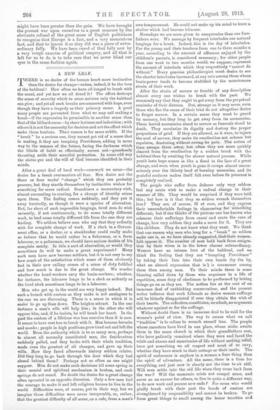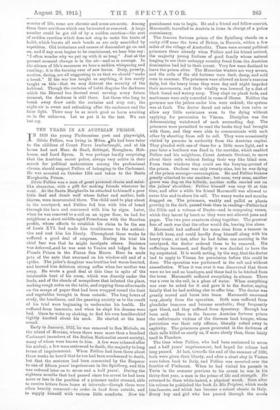A. NEW LEAF..
rrHERE is no desire of the human heart more instinctive -L than the desire for change—unless, indeed, it be the love of the habitual I How often we have all longed to break with the usual, and yet how we all dread it The effort destroys the sense of security which to some natures only the habitual can give ; and yet all such breaks are connected with hope, even though they have a tragedy as their primary cause. A good many people are prevented from what we may call making a break—if the expression be permissible in another sense than that of the billiard-room—by sheer laziness and indecision; with others it is not the necessity for decision and not the effort which make them hesitate. Their reason is far more subtle. If the " break " be a serious one, they cannot get rid of a sense that in making it they are tempting Providence, adding in some way to the menace of the future, facing the darkness which the blinds of habit so effectually screen out—gracelessly thrusting aside their merciful protection. In some odd way the status quo and the will ef God become identified in their minds.
After a great deal of hard work—overwork we mean—the desire for a break overmasters all fear. Men desire not the three or four weeks' " change " which they can probably procure, but they startle themselves by instinctive wishes for something far more radical. Sometimes a momentary wish, almost amounting to craving, for a change of identity seizes upon them. The feeling comes suddenly, and they put it away hurriedly, as though it were a species of aberration. But, far short of such impossible longings, tired. men do wish earnestly, if not continuously, to do some totally different work, to lead some totally different life from the one they are leading. We seldom believe men who say that they ardently wish for complete change of work. If a Clerk in a Govern- ment office, or a doctor, or a stockbroker could really make us believe that he would rather be a fisherman, or a farm labourer, or a policeman, we should have serious doubts of his complete sanity. Is this a sort of aberration, or would they sometimes do well to make a great experiment ? Many such men have now become soldiers, but it is not easy to say how much of the satisfaction which some of them obviously feel in their new calling comes of a sense of duty fulfilled and how much is due to the great change. We wonder whether the hand-workers envy the brain-workers; whether, for instance, the labourer longs to be a clerk as ardently as the tired clerk sometimes longs to be a labourer.
Men who get up in the world are -very happy indeed. But such a breach with custom as they make is not analogous to the one we arc discussing. There is a sense in which it is easier to go up than down. The heights attract. In the one instance a man's wife will help him ; in the other she will oppose him, and, if.he insists, he will break her heart. In the past the custom of a lifetime was less coercive than it is now. It seems to have cost leas to break with it. Men became hermits and monks ; people in high positions grew tired out and left the world. Even the authority which is to so many men, perhaps to almost all normally constituted men, the desideratum suddenly palled, and they broke with their whole tradition, made even the greatest of all changes, and gave up their wills. How they fared afterwards history seldom relates. Did they long to go back through the door which they had closed behind them ? Perhaps not so often as one might suppose. Men do not make such decisions till some spring in their mental and spiritual mechanism is broken, and such springs do not mend. No doubt the desire for a great change often operated in an opposite direction. Only a few men had the courage to make it and left religious houses to live in the world. Difficulties were, of course, put in their way, but we imagine those difficulties were never insuperable, or, rather, that the greatest difficulty of all arose; as a rule, from a,. man's
, own temperament. He could not make up his mind to leave a, !shelter which had become irksome.
Nowadays we are more given to compromise than our fore- fathers were. We assuage by frequent interludes our natural longings for a break. Indeed, this is the day of interludes. For the young and their teachers from one to three months a year, according to the amount of affluence enjoyed by the children's parents, is considered necessary ; for other people from one week to two months would, we suppose, represent the amount of interlude which they respectively "cannot do without." Every genuine philanthropist must desire to see the shorter interludes increased, at any rate among those whose brain-power tends to become stultified by the monotonous strain of their work.
After the strain of sorrow or trouble of any description almost every one wishes to break with the past. We commonly say that they ought to get away from the perpetual reminder of their distress. But, strange as it may seem, even those who flee the scene of their trial do not altogether desire to forget sorrow. In a certain sense they want to guard its memory, but they long to get away from its accessories., These horrid accessories stand to sorrow as funerals stand to' death. They secularize its dignity and destroy the proper proportions of grief. If they are allowed,, as it were, to injure the soul of sorrow, they make its recollection not solemn but, repulsive, deadening without curing its pain. The action of time sweeps them away, but often they are more quickly cleared from the recollection by a sudden break with the habitual than by awaiting the slower natural process. While youth lasts hope comes in like a flood in the face Of a great change, and even when youth is gone it creeps almost uncon- sciously over the thirsty land of burning memories, and its grateful coolness makes itself felt even before its presence. ie completely realized.
The people who suffer from dulness only very seldom feel any acute wish to make a radical change in their manner of life. They would be surprised if they were told this ; but how is it that they so seldom wrench themselves free ? They are, of course, ill at ease, and! they express their uncomfortable feelings in clamouring for something different; but if one thinks of the persons one has known who rehearse their sufferings from ennui and crave the cure of change, how very seldom they make a move: for it. They are' like children. They do not know what they want. We think that one reason why men who long for a " break". so seldom make one is, as we have already suggested, thattheir women- folk oppose it. The number of men held back from emigre.. Lion by their wives is in the lower classes extraordinary. Women have an intense love of the habitual, and we. think the feeling that they are "tempting Providence" by taking their fate into their own hands (by the by, what an absurd expression that is !) is commoner among, them than among men.. To their minds. there is seine blessing called down by those who acquiesce in a life of ' repetition, some duty of obedience to be performed by letting things go on as they are. The notion lies at the root of an immense deal of unthinking conservatism, and the: present writer believes that such Liberals as desire woman suffrage will be bitterly disappointed if ever they obtain the wish of their hearts. T he reflection constitutes) we admit, no argument , whatever against or for the suffrage. Without doubt there is an immense deal to be said for the' women' point of view. The way to amass what we call "tradition" is to refuse to wrench. oneself free. The people , whose ancestors have lived in one place, whose niche awaits them in the same church in which their grandfathers rest, who have patiently remained where they were and faced' the trials and shams and monotonies of life without seeking. relief, have got something we all respect and most of us envy, whether they have stuck to their cottage or their castle. The spirit of endurance is anyhow in. a woman a finer thing than the spirit of adventure.. All the same, there is a time for everything, and just now is clearly not the time to sit still. Will men settle into the old' life when they come back from the war ? Will the economic crisis not compel some, and serve as an excuse for others„ to live in quite a different way, to do new work and pursue new ends P For some who would gladly break with their past the bonds of custom are strengthened by responsibility and cannot. be broken. To go. from great things to small among, the lesser troubles ar.d.
worries of life, some are chronic and some are acute. Among them there are those which can be treated or removed. A large number could be got rid of by a sudden exertion—the sort of sudden exertion which doetsnot ,stop to untie the knots of habit, which bursts all such bonds as are only sanctified by repetition. Old irritations and causes of discomfort go on and on, and if any man begins to be reminiscent, we hear him say : "I often wonder why we put up with it so long." Just at the present moment change is in the air—and so is courage. In the silence of life's sameness we bear a sudden whispering and rustling; it is the turning over of new leaves. Duty, poverty, caution, daring, are all suggesting to us that we should "make a break." If the war has taught us anything, it has surely taught us this—that we may distrust the security of the habitual. Though the curtains of habit disguise the darkness which the Eternal has decreed must envelop every future Moment, the darkness is still there. Let those who long to break away draw aside the curtains and step out ; the night air is sweet and refreshing after the enclosure and the false light. There may be as much good as harm awaiting us in Me unknown. Let us put it to the test. We can but try.



































 Previous page
Previous page